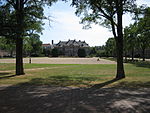Bijvoet Centre for Biomolecular Research
AC with 0 elementsResearch institutes established in 1988Research institutes in the NetherlandsUtrecht University
The Bijvoet Centre for Biomolecular Research is a research institute at Utrecht University. The Bijvoet Centre performs research on the relation between the structure and function of biomolecules, including proteins and lipids, which play a role in biological processes such as regulation, interaction and recognition. The Bijvoet Centre houses advanced infrastructures for the analysis of proteins and other biomolecules using NMR, X-ray crystallography, electron microscopy and mass spectrometry. The institute is named after famous Dutch chemist Johannes Martin Bijvoet, who worked at Utrecht University.
Excerpt from the Wikipedia article Bijvoet Centre for Biomolecular Research (License: CC BY-SA 3.0, Authors).Bijvoet Centre for Biomolecular Research
Padualaan, Utrecht
Geographical coordinates (GPS) Address Nearby Places Show on map
Geographical coordinates (GPS)
| Latitude | Longitude |
|---|---|
| N 52.085545 ° | E 5.168971 ° |
Address
Hugo R. Kruytgebouw (UU)
Padualaan
3584 CC Utrecht (Utrecht)
Utrecht, Netherlands
Open on Google Maps






